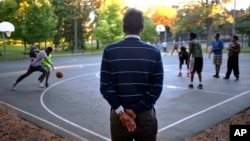Too often young Somali-Americans in Minnesota have made headlines for all the wrong reasons: a small number have fallen prey to the lure of drugs, gangs and extremist ideology.
But youth organizations in the state are trying to change that. A group of 12 youth basketball teams representing mosques around the Twin Cities held a tournament recently where young people were given the chance to build athletic skills and gain self-esteem.
Zakariye Ibrahim, one of the players from the al-Rawda team, representing the mosque that won the tournament, said these types of programs are important.
Watch: Basketball Gives Somali Youth in Minnesota a Positive Outlet
"We have succeeded in winning the cup after beating the finalist Umatul-Islam club. We had worked very hard for this and we are so excited about it," Zakariye said.
Somali population
Minnesota is home to the largest Somali community in the U.S., with more than 20,000 people living in the state out of a total of 80,000 across the country.
The Federal Bureau of Investigation (FBI) said about a dozen Somalis have joined militant groups in Syria in recent years and about 22 men have been lured to join al-Shabab in Somalia in incidents dating back to 2007. Most recently, nine Somali-American men were accused of plotting to join Islamic State and sentenced to prison by a Minnesota federal court.
The basketball tournament is an example of a program geared toward providing extracurricular activities to fend off some of the negative influences that Somali youth face.
Beza Tesfaye, conflict and governance research manager for Mercy Corps, has done research in Somalia, Somaliland and Puntland on why young people join extremist groups.
Tesfaye found that, contrary to popular opinion, it is not poverty or unemployment that are the main factors that push Somalis toward extremism groups. Instead, the strongest driving factors are young people who feel their voices are not being heard, that they are unable to participate politically and feel discriminated against based on clan or ethnic group, she said.
Meaningful opportunities
It is important to give young people opportunities to do something meaningful in their communities, she added.
"This included activities like volunteering, doing awareness campaigns around salient issues that young kids cared about," Tesfaye said. "Essentially just giving them a platform to express themselves in addition to giving them the skills they need to express themselves through education."
Tesfaye said that a combination of education and civic engagement of Somali youth reduced the participation in extremist and political violence.
"The key takeaway is that civic engagement and civil society is a real need if we are trying to address the root causes of violence and we have evidence to sort of support that, quantitative evidence," she said.
A local organization behind the tournament, "For Youth by the Youth," hopes something as simple as basketball can have a similar impact.
Yusuf Mohamed, head of the organization, said the program is meant to fill a void in the lives of some young people.
"We saw what the youth are going through and how they were involved with gang fights among themselves," Mohamed said. "When we saw how they are suspected or labeled as extremists, we started to bring them together in order to prevent them from getting involved with drugs. We found a place where they can stay fit and stay busy and avoid negative influences."
One of the players, Abdullahi Bare, agrees that sport can be a unifying force for good. "This kind of tournament brings us together as brothers. We come together and when we finish the games we eat together and communicate as well."
The basketball tournament is an annual event in Minnesota that has been going on for three years.












